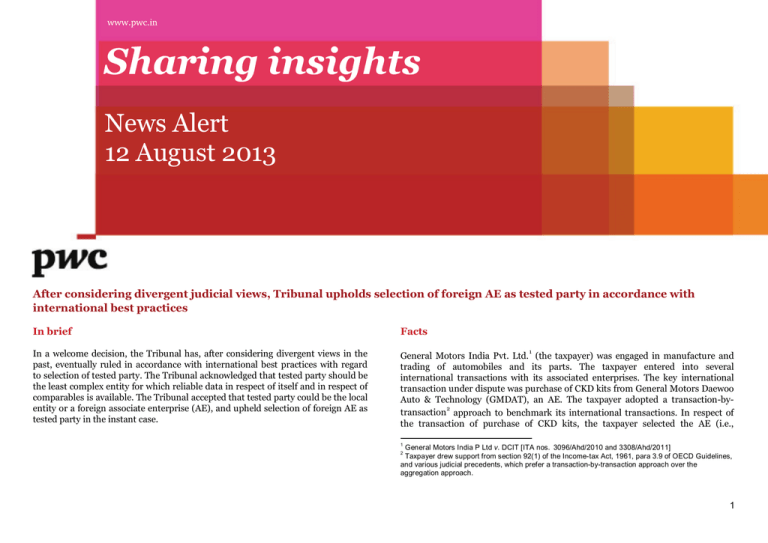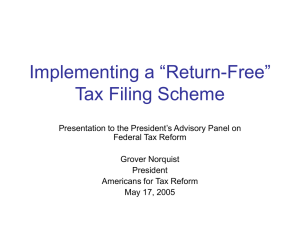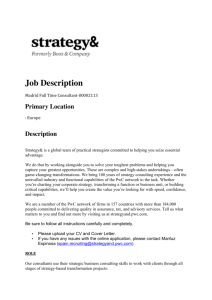
www.pwc.in
Sharing insights
News Alert
12 August 2013
After considering divergent judicial views, Tribunal upholds selection of foreign AE as tested party in accordance with
international best practices
In brief
Facts
In a welcome decision, the Tribunal has, after considering divergent views in the
past, eventually ruled in accordance with international best practices with regard
to selection of tested party. The Tribunal acknowledged that tested party should be
the least complex entity for which reliable data in respect of itself and in respect of
comparables is available. The Tribunal accepted that tested party could be the local
entity or a foreign associate enterprise (AE), and upheld selection of foreign AE as
tested party in the instant case.
General Motors India Pvt. Ltd. (the taxpayer) was engaged in manufacture and
trading of automobiles and its parts. The taxpayer entered into several
international transactions with its associated enterprises. The key international
transaction under dispute was purchase of CKD kits from General Motors Daewoo
Auto & Technology (GMDAT), an AE. The taxpayer adopted a transaction-by2
transaction approach to benchmark its international transactions. In respect of
the transaction of purchase of CKD kits, the taxpayer selected the AE (i.e.,
1
1
General Motors India P Ltd v. DCIT [ITA nos. 3096/Ahd/2010 and 3308/Ahd/2011]
Taxpayer drew support from section 92(1) of the Income-tax Act, 1961, para 3.9 of OECD Guidelines,
and various judicial precedents, which prefer a transaction-by-transaction approach over the
aggregation approach.
2
1
PwC News Alert
August 2013
GMTAD) as the tested party and benchmarked using foreign comparables. The
transfer pricing officer (TPO) rejected this approach, and proposed an adjustment
by selecting the taxpayer as the tested party instead, and benchmarking it against
local comparables. The DRP upheld the TPO’s approach. Aggrieved, the taxpayer
appealed to the Tribunal.
The key contentions raised by both, the taxpayer and the Revenue, primarily
revolved around two aspects, viz., functional profile of the taxpayer vis-à-vis that
of the AE; and data on foreign AE and foreign comparables.
Taxpayer’s contentions
1.
The taxpayer contended that with respect to CKD kits manufactured and sold
by the AE, the functional and risk profile of the taxpayer were more complex
than that of the AE. AE acted as a contract manufacturer for the taxpayer. It
assumed limited risks and undertook limited functions, such as production,
procurement, quality control, packing, storing, shipping, etc.
2. Financial and other data on comparable companies had been provided. From
the financial data, the PLI could be reliably computed, and the same had also
been audited by independent auditors and was hence reliable. Further,
segmental financial data of the AE had been furnished for benchmarking a part
of the AE’s business which related to manufacturing and sale of CKDs to the
taxpayer. The segmental data was based on sound allocation keys and had
been independently reviewed by a third party who had also issued a report
thereof that the allocation was reasonably accurate.
3. To support selection of foreign AE as tested party, reliance was placed on
decisions in cases of Development Consultants, Mastek Ltd, and AIA
5
Engineering .
Revenue’s contentions
1.
GMDAT was an entrepreneur and cannot be the tested party. It was a complex
entity with operations across multiple geographies, having substantial related
party transactions, and owing intangibles.
The taxpayer, on the other hand, performed an entrepreneurial role in relation
to sale of GM cars in India. Its functions included identification of market
opportunities; production and assembly; purchasing; designing; managing
3
supply chain and logistics; R&D (on its own account) for indigenisation and
4
for adopting the cars’ basic technology to suit the Indian environment ;
building the dealer network; and performing the overall sales and marketing
function (including after-sales service).
2. Sufficient and reliable data on foreign comparables was not available. They
were in different geographies, and no adjustment had been made for the many
geographic differences that existed. There were functional dissimilarities too,
and segmental data for the specific comparable function may not have been
available.
The taxpayer was responsible for developing the market, and for developing
local marketing intangibles for competing in the Indian market. The taxpayer
assumed market risk, product failure risk, obsolescence risk, etc. Its
profitability was impacted by a number of factors including external market
conditions and competition. Thus, it was difficult to accurately adjust the
taxpayer’s financials.
The Tribunal acknowledged that tested party should be the least complex entity,
for which reliable data in respect of itself and in respect of comparables is
available. The Tribunal accepted that tested party could be the local entity or a
foreign AE, and upheld selection of foreign AE as tested party in the instant case.
In doing so, the Tribunal:
Tribunal Ruling
5
3
Replacing imported components with alternative local ones.
4
Adopt the car’s basic technology to suit the Indian environment because of regulatory changes,
customer feedback etc.
Development Consultants P Ltd v. DCIT [2008] 115 TTJ 577 (Kol), Mastek Ltd. v.ACIT [2012] 53 SOT
111 (Ahd), AIA Engineering Ltd. v. ACIT [2012] 50 SOT 134 (Ahd), Ranbaxy Laboratories Ltd v. ACIT
[2008] 110 ITD 428 (Delhi), and Sony India P Ltd. v. DCIT [2008] 114 ITD 448 (Delhi): [2009] 315 ITR
150 (Delhi) (AT) ].
2
PwC News Alert
August 2013
6
•
placed reliance on the UN TP Manual and judicial precedents in the cases of
Development Consultants, Mastek Ltd, AIA Engineering, Ranbaxy
5
Laboratories, and Sony India . In respect of judicial precedents, the Tribunal
agreed with the majority view and accordingly, rejected the direct applicability
7
of the divergent decision in the case of Onward Technologies to the instant
case;
•
acknowledged the taxpayer’s submissions that all financial details of
comparable companies and segmental data of the AE had been furnished and
were reliable;
•
found inconsistency in the stand taken by the TPO where in another
transaction the TPO had proposed an adjustment by selecting the foreign AE
as the tested party; and
•
negated the TPO’s argument that foreign comparables do not fall within his
jurisdiction and he can therefore neither call for any additional information
nor scrutinize their books of accounts etc. In this regard, the Tribunal stated
that Revenue can get all relevant information from across the globe by using
technology or by directing the taxpayer to furnish the same.
PwC Observations
The principle of “tested party” is enshrined in the fundamentals of transfer pricing.
However, lack of guidance in this regard in the Indian transfer pricing regulations
has led to divergent views being taken by Indian judicial authorities. In a welcome
decision, the Tribunal has, after considering divergent views in the past, eventually
ruled in accordance with international best practices embodied in the OECD
Guidelines, US TP regulations and now, the UN TP Manual.
6
7
Paras 5.3.3.1. and 10.4.1.3.
Onward Technologies Ltd. v.DCIT [2013] 35 taxmann.com 584 (Mum)
Although not explicitly discussed, however, by accepting the AE as the tested
party, the Tribunal has implicitly accepted the relatively more complex/
entrepreneurial characterisation of the taxpayer vis-à-vis the foreign AE. Notably,
the characterisation of these entities is only with respect to the international
transaction of purchase of CKD kits, and not for the entities as a whole. This is an
important takeaway. It may be noted that the Revenue, in the instant case,
evaluated the AE on an entity-wide basis and thus found it to be more complex
than the taxpayer. However, in a transaction-by-transaction approach, as was
adopted by the taxpayer in the instant case, the tested party must be selected with
respect to that particular transaction only.
To decide which is the lesser or more complex entity, a detailed functions, assets
and risks (FAR) analysis must precede the selection of tested party. Particularly
while selecting a foreign AE as tested party, such FAR analysis must be elaborately
documented, and it would be important for taxpayers to be able to substantiate the
same as well. To substantiate, support could also be drawn from various industry
factors and trends. For example, in the instant case, the auto industry in which the
taxpayer operates has been faced with sluggish demand and rising input costs.
These trends have compelled industry players to focus on controlling costs, and
one effective way to achieve that has been to indigenise/localise, which is a lengthy
process spanning over many years. Therefore, in the instant case, besides the
routine functions of manufacturing, procurement, etc., the taxpayer was said to
have been faced with significant market risks and was also undertaking R&D on its
own account (for indigenisation, etc.). All this substantially raised the risk profile
of the taxpayer vis-à-vis the foreign AE, and made the foreign AE an obvious
choice for tested party.
Data availability in respect of the foreign AE and foreign comparables is the other
important requisite when selecting a foreign AE as tested party. Notably, to
establish reliability of the data, the Tribunal has, in the instant case, given
importance to an independent audit and review of such data.
3
PwC News Alert
August 2013
About PwC
PwC* helps organisations and individuals create the value they’re looking for. We are a network of firms in 158 countries with more than 180,000 people who are committed
to delivering quality in assurance, tax and advisory services.
PwC India refers to the network of PwC firms in India, having offices in: Ahmedabad, Bangalore, Chennai, Delhi NCR, Hyderabad, Kolkata, Mumbai and Pune. For more
information about PwC India's service offerings, please visit www.pwc.in.
*PwC refers to PwC India and may sometimes refer to the PwC network. Each member firm is a separate legal entity. Please see www.pwc.com/structure for further details.
Tell us what matters to you and find out more by visiting us at www.pwc.in.
Our offices
Ahmedabad
Bangalore
Chennai
Hyderabad
Kolkata
President Plaza, 1st Floor Plot No 36
6th Floor, Millenia Tower 'D'
8th Floor, Prestige Palladium Bayan
#8-2-293/82/A/113A Road no. 36,
56 & 57, Block DN.
Opp Muktidham Derasar
1 & 2, Murphy Road, Ulsoor,
129-140 Greams Road,
Jubilee Hills, Hyderabad 500 034,
Ground Floor, A- Wing
Thaltej Cross Road, SG Highway
Bangalore 560 008
Chennai 600 006, India
Andhra Pradesh
Sector - V, Salt Lake.
Ahmedabad, Gujarat 380054
Phone +91-80 4079 7000
Phone +91 44 4228 5000
Phone +91-40 6624 6600
Kolkata - 700 091, West Bengal, India
Telephone: +91-033 - 2357 9101/4400 1111
Phone +91-79 3091 7000
Fax: (91) 033 - 2357 2754
Mumbai
Gurgaon
Pune
For more information contact us at,
PwC House, Plot No. 18A,
Building No. 10, Tower - C
GF-02, Tower C,
pwctrs.knowledgemanagement@in.pwc.com
Guru Nanak Road - (Station Road),
17th & 18th Floor,
Panchshil Tech Park,
Bandra (West), Mumbai - 400 050
DLF Cyber City, Gurgaon
Don Bosco School Road,
Phone +91-22 6689 1000
Haryana -122002
Yerwada, Pune - 411 006
Phone : +91-124 330 6000
Phone +91-20 4100 4444
For private circulation only
This publication has been prepared for general guidance on matters of interest only, and does not constitute professional advice. You should not act upon the information contained in this publication without obtaining specific professional advice. No
representation or warranty (express or implied) is given as to the accuracy or completeness of the information contained in this publication, and, to the extent permitted by law, PwCPL, its members, employees and agents accept no liability, and disclaim
all responsibility, for the consequences of you or anyone else acting, or refraining to act, in reliance on the information contained in this publication or for any decision based on it. Without prior permission of PwCPL, this publication may not be quoted in
whole or in part or otherwise referred to in any documents.
©2013 PricewaterhouseCoopers. All rights reserved. "PwC", a registered trademark, refers to PricewaterhouseCoopers Private Limited (a limited company in India) or, as the context requires, other member firms of PricewaterhouseCoopers International
Limited, each of which is a separate and independent legal entity.
4





